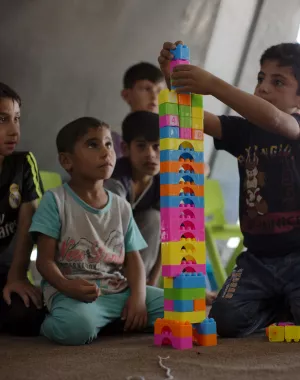Overview
Huge efforts are made by the international humanitarian community to meet the physical needs of children, by providing shelter, food and water. Their needs for mental health and psychosocial support are often not addressed, however. Without this support children risk developing greater psychological, social and emotional problems later in life, severely limiting their ability, and that of their families and communities, to rebuild post-conflict.
Over recent years, the humanitarian community has responded to the need to provide Mental Health and Psychosocial Support (MHPSS). Emerging evidence suggests such efforts are more effective when tailored to local needs and integrated with the provision of other aid components. Efforts to date have also largely focused on direct work with children, rather than other levels of their social ecology. Without also working with children’s support networks – their parents/caregivers, siblings, teachers, social workers and community members – children remain exposed to daily stressors in their present environment that exacerbate their mental health and psychosocial challenges. Daily stressors within the family home and wider social environment – such as putting enough food on the table, finding warm clothes in winter, inter-parental stress and violence, cramped and insecure living conditions – have been found to have a greater negative impact on children’s mental health and psychosocial wellbeing than direct exposure to armed conflict.
The findings in this report highlight the need for a multi-level response that works with children and their support networks in multiple spaces and through the delivery of complementary interventions.
Download the report to read more.

